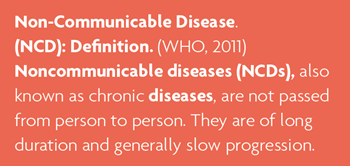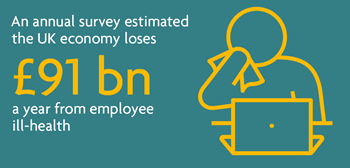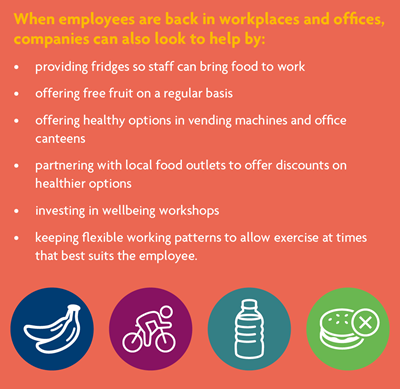NEWS
Tuesday 12 January 2021
January is the time of year when most of us promise ourselves we will live healthier, happier lives, that we will make positive changes and stick to them no matter what! Of course, as we all know, that’s challenging at the best of times – and the start of 2021 is unlikely to be ‘the best of times’ for many of us.
All too often New Year’s intentions end with us reverting to our old, less-healthy behaviours disappointingly quickly, but that is by no means always the case. New goals, ambitions and resolutions can become long-term reality and lead to meaningful behaviour change. The questions is: as employers, how do you support your staff in keeping up these new healthy, happy habits?
The top three New Year’s resolutions for 2020 in the UK were improving fitness (47%), losing weight (44%) and improving diet (41%).1 In the US it was a similar story, half (50%) of those surveyed planned to exercise more while 43% intended to eat more healthily and 37% were going to lose weight.2
These are typical of many New Year’s resolutions each and every year, but that doesn’t mean they’re not important. Many employees understand the need to make meaningful changes to their health and lifestyle – especially in the face of a global obesity crisis. The World Health Organization (WHO) estimates that more of us are obese than underweight in almost every region of the world (excepting parts of sub-Saharan Africa and Asia.3
And the link between an unhealthy lifestyle, being obese and having a chronic illness (often called a non-communicable disease) is both clear and increasingly well understood. Data shows that chronic or lifestyle diseases now make up seven of the top ten global causes of death, up from four in 2000. These diseases are preventable and the WHO says that there is a “need for an intensified global focus on preventing and treating cardiovascular diseases, cancer, diabetes and chronic respiratory diseases, as well as tackling injuries, in all regions of the world”. 4
Dr Tedros Adhanom Ghebreyesus, Director- General of WHO commented on these startling statistics, saying, “These new estimates are another reminder that we need to rapidly step up prevention, diagnosis and treatment of non-communicable diseases.”
 As the COVID-19 pandemic continues to grip so many countries around the world – and the increased mortality rate from the virus with those who suffer from these chronic conditions is more evident than ever – it’s never been more important for employers to encourage and enable positive long-term behaviour change and healthy lifestyles.
As the COVID-19 pandemic continues to grip so many countries around the world – and the increased mortality rate from the virus with those who suffer from these chronic conditions is more evident than ever – it’s never been more important for employers to encourage and enable positive long-term behaviour change and healthy lifestyles.
The new year – and this new year in particular – could be the perfect time to take action.
Unhealthy workforces – costly for employers
An unhealthy workforce can be extremely costly for employers in a number of different ways. Firstly, if a workforce is particularly unhealthy or employees have multiple chronic conditions, they’re expensive to insure. Four of the ten most costly conditions for US employers are angina pectoris or chest pain, high blood pressure, diabetes and heart attack5 – all of which can be linked to unhealthy lifestyles.
Preventable chronic conditions are a major contributor to the rising cost of healthcare around the world – rises that have been consistently above the rate of inflation (5% over the rate of inflation in 2021, according to Aon).6 Helping employees to become healthier can help employers to control benefits and claims costs.
Not only that, but promoting healthier lifestyles helps businesses to improve productivity and reduce absenteeism. The US Centers for Disease Control and Prevention (CDC) estimates that high blood pressure, diabetes, smoking, physical inactivity and obesity combined, costs US employers US$36.4 billion a year in days away from work.5 And research in the European Union estimates the cost in productivity losses due to cancer because of early death at €42.6 billion and lost working days at €9.43 billion.7 Of course, not all cancers are preventable by living a healthier lifestyle, but these are still pretty stunning figures!
An annual survey estimated the UK economy loses £91 billion a year from employee ill-health and that around two out of five people suffers from at least one chronic condition.
In a foreword to the report, Professor Christopher Whitty, Chief Medical Officer for England and Chief Medical Adviser to the UK Government wrote: “The area with the greatest opportunity for substantial improvement is using the workplace to maintain and enhance health. Many people spend 40 years or more in work. Modest improvements over that length of time can have a substantial impact on the probability of remaining healthy (and productive) during later working life and well into retirement.”8
“Many people spend 40 years or more in work. Modest improvements over that length of time can have a substantial impact on the probability of remaining healthy and (productive) during later working life and well into retirement”
The COVID-19 effect
We can be excused for not following through on our resolutions in 2020 – the arrival of COVID-19 in the early part of the year certainly derailed many people’s good intentions worldwide. But has this caused people to give up on making resolutions for 2021, or made us more to likely to stick to them?
When it’s hard to know what the future might bring, it could be challenging to make lasting, meaningful changes. And with social distancing still in full force in many countries, some could look to stick with the less healthy comforts that have helped them cope with the stress of pandemic life. Alternatively, if a healthier lifestyle increases your chance of surviving should you catch the virus… wouldn’t you want that?
Dry January, started in the UK by the charity Alcohol Change UK has been adopted around the world and encourages people to give up alcohol for the whole month. Around four million people take part each year, and evidence suggests it has a high success rate with around 72% of participants regularly drinking less alcohol six months after the end of the challenge.9 Yet, with social restrictions in place in many countries, could schemes like this see a reduced take up in 2021?
A recent poll in the US, however, found that a good proportion of people are still looking to make a resolution this year. And they are not only related to physical health. Of the nearly two out of five Americans surveyed who have planned a resolution for 2021, around three quarters of those say the pandemic has shaped their goals – with some mentioning reconnecting with family and friends or managing their finances better.10 Wellness comes in many forms.
And it’s important to remember that employers can reap the rewards of helping their employees achieve their resolutions – whatever those resolutions might be.
Simple ways to help
For many people, working from home during the pandemic has meant healthier lifestyles. Many employers have allowed flexible working hours, meaning employees have more time to exercise – going for a run or walk at lunchtime might be more convenient – and find it easier to eat more healthily when preparing lunches and dinners in their own kitchens.
And some employers are going one step further and are finding ways to support staff with their exercise goals by encouraging employees to exercise remotely, setting up classes or blocking out set times for employees to work out at the same time.
Businesses can also encourage staff to make and take calls while walking as long as they do not need to be on video and the noise isn’t too disruptive. Setting exercise challenges for staff – such as hitting 10,000 steps a day for 30 days in a row and awarding prizes for those that complete them is another good idea.
Plus, employers can offer lifestyle benefits like discount schemes for gyms (when open), sportswear and wearable tech that helps them monitor their activities. A smart watch, for example, which sets goals and offers daily reminders can be a great way to keep on track.
Building an online exercise community11
Strava, which now has 73 million users worldwide, said that, on average, each month in 2020 saw two million people registering with its app for the first time. The app uses GPS technology to record exercise and allows users to compare performances.
“COVID-19 has presented many people with the unique opportunity to exercise more, because, practically, people have fewer reasons not to,” Dr Charlotte Hilton, of the British Psychological Society, said.
 “If nothing else, exercise outdoors provides us with some welcome relief from spending so much time indoors during lockdown.
“If nothing else, exercise outdoors provides us with some welcome relief from spending so much time indoors during lockdown.
“However, because of the social restrictions that COVID-19 brings, more people may be turning to online exercise communities and apps to enhance their connectedness to other like-minded people who enjoy exercise.”
Employers could encourage staff to join an online community or build an online exercise challenge to encourage their employees to be active and healthy.
But should employers help at all?
We’ve given many good reasons for employers to support employees’ healthier lifestyles and a few examples of how, but should they get involved at all? Employers need to be respectful when looking to help their employees improve their lifestyle and change their behaviours. Research from Willis Towers Watson found that 52% of UK workers are uncomfortable with their employer getting involved in their lifestyle and around 56% of respondents said diet, exercise and alcohol consumption are personal choices. Despite that, 30% see their employers as having a moral responsibility to help them lead a fit and healthy lifestyle.12
Mike Blake, Wellbeing Lead at Willis Towers Watson, said, “Companies must tread carefully if they are to adequately support their workers whilst also ensuring their privacy is respected. Although a healthy workforce benefits business, driving down presenteeism and absenteeism and boosting productivity and retention, employees don’t always appreciate their employer intervening on matters of personal wellbeing.”12
The safest approach for employers seems to be offering access to support, providing education and equipping workers with the tools to become healthier while allowing people to choose how much or how little they want to get involved.
Professor Christopher Whitty, Chief Medical Officer for England, and Chief Medical Adviser for the UK Government8
“Most organisations and companies that are very systematic and evidence-led about efficiency, productivity and return on investment are unsystematic in their approach to health improvement. This is a shame because the opportunities are considerable.
“It should be relatively straightforward to test different approaches. Health gains are largely measurable, and methods such as randomised controlled trials allow us to test rigorously which interventions work.
 “If we can take the same scientific approach to testing interventions to promote health at work as we have to reducing injury, occupational diseases and exclusion of people with disability, this could be a key area for advances over the next decade.”
“If we can take the same scientific approach to testing interventions to promote health at work as we have to reducing injury, occupational diseases and exclusion of people with disability, this could be a key area for advances over the next decade.”
The New Year is the ideal time to consider a new approach as many employees will already be thinking about the improvements they want to make to their own health and wellness, especially as the COVID-19 pandemic remains a major concern.
The focus for employers has been on attempting to promote healthier lifestyles for employees for a while now, but the start of 2021 provides the ideal opportunity to refocus and re-energise programmes that are already underway.
Unhealthy workforces mean higher costs and there are other significant gains for companies, like increased productivity and lower absence levels to be achieved if they can support staff in changing behaviour.
The challenge is how to do it in a way which is supported by employees and lasts for the long-term.
1 Martin Armstrong, Statista https://www.statista.com/chart/20381/most-common-new-years-resolutions-gb/ (sourced December 2020)
2 Jamie Ballard, YouGov https://today.yougov.com/topics/lifestyle/articles-reports/2020/01/02/new-years-resolutions-2020-health-finance (sourced December 2020)
3 Anon, World Health Organization https://www.who.int/news-room/fact-sheets/detail/obesity-and-overweight (sourced December 2020)
4 Anon, World Health Organization https://www.who.int/news/item/09-12-2020-who-reveals-leading-causes-of-death-and-disability-worldwide-2000-2019 (sourced December 2020)
5 Anon, US Centers for Disease Control and Prevention https://www.cdc.gov/chronicdisease/resources/publications/factsheets/workplace-health.htm (sourced December 2020)
6 Anon, Aon https://3m6w2j41thj22e9d871hrk9d-wpengine.netdna-ssl.com/wp-content/uploads/sites/147/2020/10/2021-Global-Medical-Trend-Rates-Report.pdf (sourced January 2021)
7 Jen Remnant, Personnel Today https://www.personneltoday.com/hr/the-ticking-time-bomb-of-chronic-illness/ (sourced December 2020)
8 Anon, Financial Times, Health at Work report https://www.vitality.co.uk/media-online/britains-healthiest-workplace/pdf/2019/health-at-work-2019_uk.pdf (sourced December 2020)
9 Anon, Alcohol Change https://alcoholchange.org.uk/get-involved/campaigns/dry-january/about-dry-january/what-is-dry-january (sourced December 2020)
10 Justin Stabley, PBS https://www.pbs.org/newshour/nation/how-the-pandemic-is-shaping-our-2021-resolutions-and-what-experts-want-you-to-keep-in-mind (sourced January 2021)
11 Christina Criddle, BBC https://www.bbc.co.uk/news/technology-55318822 (sourced December 2020)
12 Anon, Willis Towers Watson https://www.wtw-healthandbenefits.co.uk/news/half-of-uk-workers-uncomfortable-with-employer-getting-involved-in-personal-lifestyle-choices (sourced December 2020)
This document has been prepared by MAXIS GBN and is for informational purposes only – it does not constitute advice. MAXIS GBN has made every effort to ensure that the information contained in this document has been obtained from reliable sources, but cannot guarantee accuracy or completeness. The information contained in this document may be subject to change at any time without notice. Any reliance you place on this information is therefore strictly at your own risk. This document is strictly private and confidential, and should not be copied, distributed or reproduced in whole or in part, or passed to any third party.
The MAXIS Global Benefits Network (“Network”) is a network of locally licensed MAXIS member insurance companies (“Members”) founded by AXA France Vie, Paris, France (AXA) and Metropolitan Life Insurance Company, New York, NY (MLIC). MAXIS GBN, registered with ORIAS under number 16000513, and with its registered office at 313, Terrasses de l’Arche – 92 727 Nanterre Cedex, France, is an insurance and reinsurance intermediary that promotes the Network. MAXIS GBN is jointly owned by affiliates of AXA and MLIC and does not issue policies or provide insurance; such activities are carried out by the Members. MAXIS GBN operates in the UK through UK establishment with its registered address at 1st Floor, The Monument Building, 11 Monument Street, London EC3R 8AF, Establishment Number BR018216 and in other European countries on a services basis. MAXIS GBN operates in the U.S. through MetLife Insurance Brokerage, Inc., with its address at 200 Park Avenue, NY, NY, 10166, a NY licensed insurance broker. MLIC is the only Member licensed to transact insurance business in NY. The other Members are not licensed or authorised to do business in NY and the policies and contracts they issue have not been approved by the NY Superintendent of Financial Services, are not protected by the NY state guaranty fund, and are not subject to all of the laws of NY. MAR00769/0121